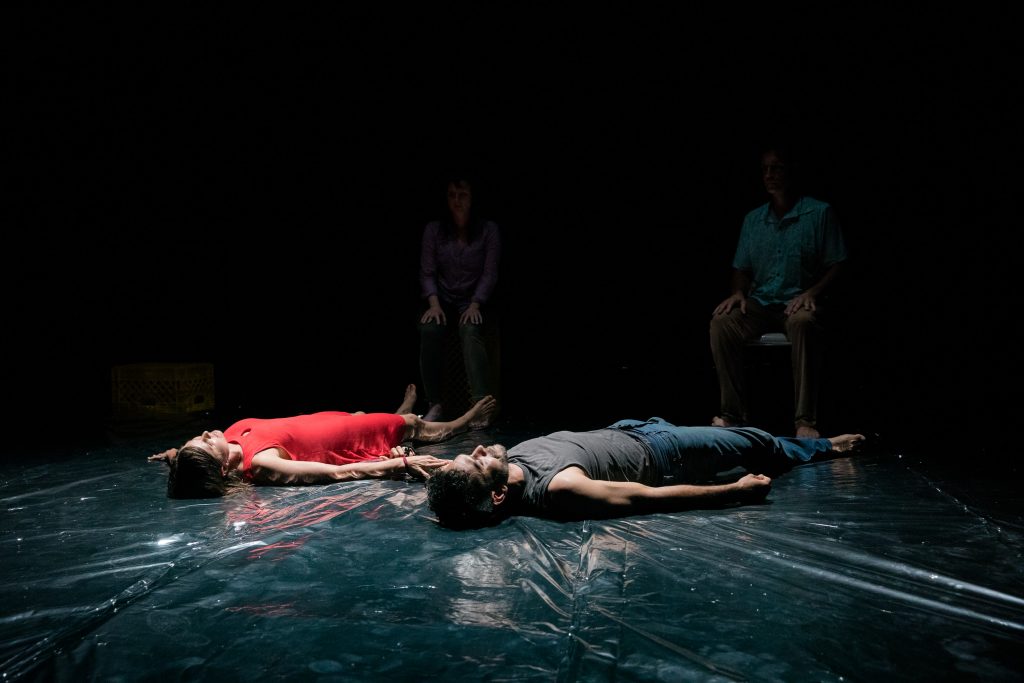Metal foil lines a bare stage, a black mirror warping the bodies of two barefoot couples in mourning. Two chairs, two milk crates rearrange themselves endlessly in patterns of resentment, avoidance, aggression, indifference during brief, unpredictable blackouts, as dissonant music plays and bits of glow tape flit through the dark like fireflies on a summer evening. An evening like the one that bore two children to the bottom of Black Lake.
Who were those children, and what were they to each other, to their parents? German playwright Dea Loher’s At Black Lake circles this question hungrily, like the biting kind of fly.
As Johnny, Darrell Stokes stews expertly in his own juices and hauls water in the proverbial sieve to quell the fiery outbursts of his wife Else, played with clenched intensity by Heather Benton. The pair lost their daughter Nina to a suicide pact with Fritz, the teenage son of April Sweeney’s sweetly evasive Cleo and Chris J. Cancel-Pomales’s blithe Eddie. Trauma binds the couples together despite clear antipathies, and mutual recriminations are never far behind. “They didn’t like Nina,” runs one bitter refrain in a text ably translated by Daniel Brunet that relies heavily on repetition as both a distancing device and a linguistic mirror of the obsessive thought patterns characteristic of trauma victims.
But far from inviting us to see these four as victims, Loher’s verse play presents them in a stark, unflattering light, made starker still by set and lighting designer Krista Smith’s inspired use of the reflective floor as a gigantic bounce. Lit menacingly from below, the couples stare into the imagined waters at the fading light of their sinking hopes—when they aren’t busy menacing or seducing each other.
Narrative structures heave briefly and collapse like feeble waves on the shores of the lake. Sometimes the story of their children gets passed around like a joint. Sometimes it wells up in their throats in the midst of banal conversation. But mostly it goads them like a gadfly. In the end they are slipping on water and blood while the others look on. They are copulating in an amorphous pile of animal misery. They are talking blankly about tomorrow.

For a German audience these are familiar waters. This kind of post-dramatic theatre has flourished on Central Europe’s national stages for so long that its conventions have coalesced into a kind of theatrical Esperanto. And director Ashley Tata is clearly a fluent speaker. Her formalized blocking bends actors’ bodies into eloquent ideograms. Her enforced rhythms reject complacent realism. Her punctuating blackouts defy naturalistic continuity. The very presence of foil on the ground augers blood as surely as a shotgun on the wall in the first act once foreshadowed gunshots in the last.
On the one hand, it’s refreshing and encouraging to see this language spoken on an American stage. On the other, it’s a reminder that the language is a purely theoretical construct. As such, it conveys abstract ideas with precision and clarity, but falls short when expressing emotion. In matters of the heart, it’s a poem in Esperanto.
Which raises the question why Loher and Tata chose this approach for a story so emotional and intimate. Distancing effects were originally developed as a means of getting theatergoers to think, to achieve class consciousness, historical perspective. But what is there to think about here? Two couples have lost their children through no fault of their own, a fate that could meet anyone of any class at any time in history. The story invites empathy and identification, not reflection. Yet we are systematically prevented from identifying. To what end?
There are moments when feeling breaks the bonds of formalism, such as when Benton’s dripping-wet Else sings a heartrending, rhymeless ballad. And moments when the formalism reaches such a peak of abstraction that it collapses under its own weight, the best example being Else’s frantic analysis of whether “It’s not nice here” in the children’s suicide note should be understood to emphasize “it’s” or “here.” Is the levee of formalism built precisely to break? Are the floodgates of Black Lake only closed so as to burst open dramatically at key moments? We can only speculate.
For At Black Lake, and the post-dramatic/-traumatic school of thought it represents, is demanding, provocative, question-inducing by design. This kind of work needs to be seen this side of the Atlantic, its abstract vocabulary integrated into the vernacular of America’s overly colloquial theatre. So I applaud The Tank and Necessary Digression for bringing us the results of Loher and Tata’s intensive collaboration, even if despite a decade of immersion abroad I left the theater feeling I had missed the point.
For more information visit: www.thetanknyc.org

